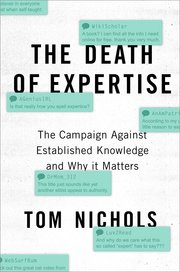
The Death of Expertise: The Campaign Against Established Knowledge and Why it Matters
by Tom Nichols
HM851 .N54 2017
New Arrivals Island, 2nd floor
Tom Nichols is a professor of national security affairs at the U.S. Naval War College, and has been an adjunct professor in the Harvard Extension School, a governmental adviser and a think-tank participant. He’s likely doing something more than Googling stuff or browsing Wikipedia entries to have earned the title of five-time undefeated Jeopardy! champion, to have provided himself with a foundation of research for this title, and to have become accomplished in his career.
If that last bit rankles, then be prepared for more discussion of how the foundational knowledge of the average person, despite access to vast amounts of information, has “crashed through the floor of ‘uninformed,’ passed ‘misinformed’ on the way down, and is now plummeting to ‘aggressively wrong’.”
He points to many of the expected culprits for this worrying spiral: social media, acting as an “echo chamber” for our biases; the loudest commentators broadcasting conclusions based on spurious evidence – if not any evidence at all; a lack of self-awareness of one’s own limitations. (To illustrate this last point, “People who claim they are ‘experts’ are sometimes only about as self-aware as people who think they’re good kissers.”) He does not let people who might be traditionally considered experts off the hook, however, dedicating a chapter to “When the Experts are Wrong.”
In 2014, Nichols contributed an article of the same title “The Death of Expertise” to the Federalist, which provides a preview of his argument. The cover of his book, not without some irony, features snippets of a few of the public comments and reaction. (“A book? I can find all the info I need online for free, thank you very much,” says WikiScholar. WebSurfBum recommends “Check out this great cat video…”) The responses, I suspect, to some extent inspired the book which followed.
For another perspective and response to Nichol’s article, read Moving Beyond Credentials, by David Weinberger, whose work focuses on how the Internet is changing human relationships, communication, knowledge and society.
Find an in-depth book review and discussion in Inside Higher Education.
Update April 14:
View a brief commentary by the author, on PBS IMHO

–True, but welcome to the Thinking Court where balls bounce boinginigly…
–(1) Know “Ways of Knowing” Culture, science, personal opinion, the New Big Thing Right Now, “common sense,” Authority, “what everyone knows,” etc.
–(2) “But science can be wrong!” Yeah, but can then be falsified and corrected…
–(3) Three ways: Fact, Opinion, Reasoned Judgment. As in “Is Alaska the coldest state? A good vacation spot? A good place to start a business now?”
–(4) “Relativism!” (A) truths are fixed!, (B) “its all relative after all,” (C) It depends upon the lens you’re using. “A male friend was totally naked in a room in Madison with a woman he’d never met before.” Pretty racy–except it was the Dermatology Dept… Two more: “This wine is terrible but I like it.” And “Adultery is not wrong because it’s a sin–it’s a sin because it’s wrong.”
–(5) Most “reasoning” is simply rationalizing–finding reasons to keep on believing what you already believe. Oh, and the smarter the person, the more elegant the web is woven. (Beware eggheads.) TTFN–I think…